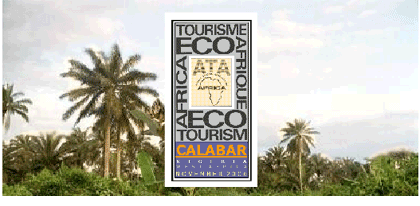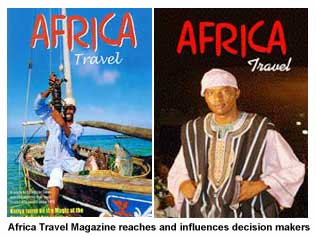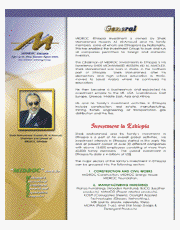|
|
|
|
|

Calabar
Hosted a Successful ATA 10th Ecotourism
Symposium
Nigeria:
A tourism destination full of challenges
by
Helen C. Broadus
I had the
wonderful opportunity to participate in a Familiarization
(FAM) Tour to Nigeria, West Africa this past October as a
member of Tourism Consortium International (TCI). The
overall purpose of this trip was to experience the level of
readiness of Nigeria's travel and tourism infrastructure to
include its hotel accommodations, air and road
transportation, hospitality amenities and security services.
This journey was made possible by the efforts of Chief
Margaret B. Fabiyi, Nigeria's ASTA Chapter President, who
was able to have KLM Royal Dutch Airlines and the Nigerian
Tourism Development Corporation (NTDC) co-sponsor the
two-week program. Click
here or on
above photos for more pictures and captions.
 Two
weeks of discovery Two
weeks of discovery
My colleagues and I really looked forward with wide-eyed
anticipation to discovering Nigeria, 'Africa's Giant in the
Sun,' because of what we had heard regarding its great
natural beauty and the friendliness of its people. I was
very interested in learning more about Nigeria, which has
over 2,000 years of tradition and culture, with a unique
combination of ancient and modern lifestyles. This very
physically demanding two-week itinerary provided everyone
with a fantastic opportunity to visit several historically
and culturally significant tourism venues in over a dozen
cities within eight states in Nigeria, West Africa to
include Lagos and Badagry in Lagos
State, Abuja, the Federal Capital, Lafia in Nassarawa State,
Jos in Plateau State, Yankari in Bauchi State, Umuahia and
Arochukwu in Abia State, and last but most interesting,
Oshogbo in Osun State.
(see
map of Nigeria)
Contact
the Nigeria Tourism Development Corporation
http://www.nigeriatourism.net/main.htm
Airport services
improved
As we
arrived in Nigeria at the Murtala Mohammed International
Airport in Lagos, we were quite surprised at the relative
ease in our processing through immigration and customs. Much
to our pleasure we were told that both the Ministry of
Aviation and the Ministry of Tourism have done an excellent
job in alleviating the extreme bottlenecks that travelers
were accustomed to experience upon arriving in Nigeria. Our
first stop was to Badagry in Lagos State, which was a
strategic trading port during the infamous transatlantic
slave trade period and the first mission post during the
advent of Christian missionaries in Nigeria.
"The
potential role of the tourism sector as a major instrument
for socio-economic development cannot be overemphasized.
These potentials cannot be realised unless our numerous
tourist attractions are well developed, packed and promoted,
with diligent attention to security and welfare of visitors.
Nigeria Tourism Official web site is set to serve as the
mouth piece of stakeholders in the pushing for positive
changes in this all-important sector. You are therefore,
invited to be part of this exciting development."
Bagadry and the Slave
Route
During our
visit in Badagry, we made a courtesy visit to see the King,
Oba Akran of Badagry and took a Special Tour of the Palace
Slave Relic Museum, Walked the Old Slave Route and ended up
at the Slave Jetty where millions of slaves were off-loaded
to be shipped abroad to an unknown destination. We also had
a chance to briefly visit the impressive white sandy beaches
at the Whispering Palm Beach Resort. Overall, my impression
of Badagry was that it offers tremendous potential for
cultural tourism as well as provides a great place to simply
relax and enjoy the beautiful oceanfront
atmosphere.
Abuja, the Federal
Capital
On our
next stop we flew into Abuja, the Federal Capital of
Nigeria. I was very impressed by the recent renovations that
were being made at Nnamdi Azikwe International Airport and
was pleased to learn that the Nigerian government was really
serious about improving the infrastructure of its airports
for incoming tourists and business people. My impression of
Abuja was that it is truly a 'City of the Future' set in a
scenic environment which reminded me very much of Denver,
Colorado. Located approximately one hour by air from Lagos,
Abuja has excellent conference and accommodation facilities
with the Nicon Noga Hilton Hotel and Sheraton Abuja Hotel
and Towers as the two main places to stay in Abuja, although
many other hotels are being constructed. Throughout Abuja
there is much construction going on and the people truly
exhibit an excitement about living in what is perhaps the
most modern city in Africa.
Nigeria Tourism
While in
Abuja, we had an opportunity to meet with the Executive
Director of the Nigerian Tourism Development Corporation,
(NTDC) Mrs. Omotayo Omotoso and her staff, during which time
we discussed areas of focus and strategies for the
improvement of the travel and tourism infrastructure of
Nigeria. Later that evening, we had a wonderful dinner
hosted by the NTDC and then took a nighttime city tour which
reminded me very much of Washington D.C. with all of the
monuments and federal buildings lit up. It was also
interesting to discover that night life in Abuja appears to
be very busy, with many of the local people and tourists
alike out and about shopping at marketplaces, eating at
restaurants and dancing at discos.
Nassawara and Bauchi
States
The next
day, our fantastic ten-day journey traversing the Nigerian
countryside began! Our first stop was to Nassawara State.
Here, we visited Lafia the capital city, which is blessed
with precious mineral deposits and learned how the state
government was in the process of conducting a tourism master
plan to create a resort facility on the outskirts of Abuja.
Nassawara State is full of impressive eco-tourism scenery to
include its majestic Farin Ruwa Water Falls, the third
largest natural waterfalls in the world. Next, we traveled
to Bauchi State to visit the Yankari National Park with its
Wikki Hot Springs. This immense wilderness area has
tremendous potential for safari excursions and outdoor
recreational activities.
Jos and Plateau State
Next, we
visited Jos the capital city of Plateau State, which is a
favorite tourist destination because of its high altitude
(approximately 1,320 meters above sea level) and temperate
climate year round. Jos is an area full of amazing natural
rock formations to include Sherre Hills, Riyom Rock
Formation, Kahwang Bassalt Rock Formation, Kerang Volcano
and Wase Rock as well as the magnificent Assop Water Falls.
The people of Jos treated us to a wonderful evening
reception with cultural entertainment. On the next day, we
had an opportunity to visit their Museum of Nigerian History
as well as briefly shop at the marketplace in Jos.
Abia 'God's Own'
State
After
visiting these fascinating locations in the northeast, we
headed south towards Abia State, affectionately referred to
as 'God's Own State' It was here that we were really treated
to the unique Nigerian traditions and cultures of its
people, with a particular emphasis on Nigeria's role in the
infamous slave trade. It was here that we experienced the
Ikoro Bende legend in the ancient town of Bende, which was
the first Colonial Divisional Headquarters of towns such as
Aba, Umuahia, and Arochukwu. The history of Bende dates back
to the period of slave trade and the extermination of the
Long Juju at Arochukwu. It was here that our group was lead
down the infamous slave trail crossing the mysterious hidden
stream and then on to the secret shrine. At this shrine, the
captives took part in rituals, which would determine their
'guilt or innocence' and whether they would be set free or
pass through the 'tunnel of no return', never to be seen
again.
While in Abia
State, we also visited the land of the Igbo people and were
exposed to several impressive welcoming festivals full of
sounds, colors and sights. We also had the opportunity to
visit several historic sites that are becoming recognized by
the Nigerian people as extremely important to their
ancestor's involvement and participation in the infamous
slave trade. One very important site, which evoked strong
emotional reactions, was the Museum of Antiquities Ujari in
Arochukwu. Relics found here were collected through trade by
barter with the slave traders. Most fascinating are the 1892
big bell, cannons, ancient chandeliers, large metal gongs,
slave chains, hand and leg cuffs, brass plates, basins,
buckets and silver jugs all believed to be from the slave
trade era. My impression of these developing sites is that
given the proper amount of research and resources, they
could easily compete with the more frequently visited slave
heritage sites of Senegal, Benin and Ghana in West
Africa.
Osun State and River
Next we
traveled west to Oshogbo in Osun State and visited the
mystical shrine to the goddess of the Osun River and learned
about the traditional ceremonial festivals that are highly
revered throughout all of Nigeria. We also had the
opportunity to pay a courtesy visit to His Royal Highness,
Ataoja of Oshogbo as well as visit several arts and
handicrafts shops in downtown Oshogbo. Our visit into
downtown Oshogbo was a fascinating cultural excursion where
we discovered the highly skilled carvers creating beautiful
handicrafts that are renowned throughout Africa and beyond.
Also, the night market was full of busy people shopping and
selling their goods to one another.
Hospitality and
Protocol
Throughout
all that we experienced, the one thing that stood out most
during our travels was our exposure to Nigerian protocol.
Nowhere in my travels throughout the Continent of Africa
have I ever been exposed to such formalities as when we
visited the Federal Officials, State Governors, Prime
Secretaries, State Tourism Commissioners, Kings and their
Courts. In every state we were exposed to extensive protocol
rituals as we made official visits and attended welcoming
ceremonies, which was a true reflection of Nigeria's
gracious hospitality and heightened excitement upon greeting
our TCI delegation from America.
In conclusion, although the tourism infrastructure in
Nigeria is not as developed as in other places in Africa,
Nigeria offers perhaps the best variety of tourist
attractions and destinations in West Africa. American
tourists will discover numerous unique scenic attractions
which differ from one place to another scattered throughout
Nigeria that will allow them to experience and enjoy the
people of Nigeria as they come in contact with the
fascinating history, ancient traditions and varied customs
of Nigeria's proud heritage. The members of TCI's delegation
found that by conducting this FAM Tour, we discovered an
unseen section of the African Continent once considered to
be 'well off the beaten path' and thus gained a greater
appreciation of Nigeria's people, culture and history. Our
congratulations to Chief Margaret B. Fabiyi, who did a
fabulous job in hosting the TCI Delegation. She really
'rolled out the red carpet' for everyone and we all left
with fond memories of our visit to Nigeria that will surely
last a lifetime!
Helen C. Broadus
is the President of Venue International Professionals, Inc.
(VIP) a full-service travel and tourism consulting firm
based in the Washington Metropolitan Area. She is a member
of the Africa Travel Association (ATA) and currently serves
as the International Secretary of the organization. She can
be contacted at 1-877-TO-VENU
Contact
the Nigeria Tourism Development Corporation
http://www.nigeriatourism.net/main.htm
@nigeriatourism.net
tel: +234 9 2347725
|
 A
A

 Two
weeks of discovery
Two
weeks of discovery